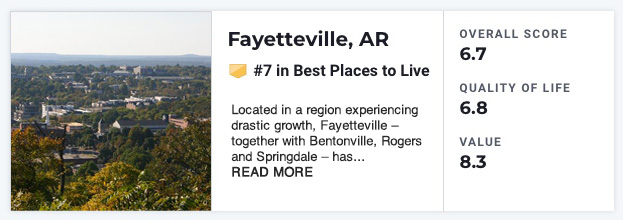
View from atop Mount Sequoyah in Fayetteville / Photo: Todd Gill, Fayetteville Flyer
FAYETTEVILLE — The area continues its streak of being ranked within the top 10 best places to live in the country by U.S. News & World Report in its annual “Best Places to Live” report.
With its No. 7 ranking, it’s the seventh year in a row for Fayetteville to be included near the top of the list. The city was named No. 3 in 2016, No. 5 in both 2017 and 2018, No. 4 in 2019, No. 8 in 2020, and No. 4 in 2021.
The list ranks the country’s 150 most populous metropolitan areas based on affordability, desirability and quality of life.
“Located in a region that’s experiencing drastic growth, Fayetteville – together with Bentonville, Rogers and Springdale – has transformed from a small town to a center of higher education, culture, commerce and entrepreneurialism,” according to the report.

2022-2023 Best Places to Live
1. Huntsville, AL
2. Colorado Springs, CO
3. Green Bay, WI
4. Boulder, CO
5. San Jose, CA
6. Raleigh & Durham, NC
7. Fayetteville, AR
8. Portland, ME
9. Sarasota, FL
10. San Francisco, CA
This year, Huntsville, Alabama, pushed Boulder, Colorado down three spots to move from No. 3 to No. 1, due to an increase in housing affordability and high quality of life. Three new cities joined the top five, including Colorado Springs, Colorado; Green Bay, Wisconsin; and San Jose, California.
Each year, U.S. News surveys people across the country on where they would like to live if given a choice. Changing preferences for where people want to live has led to some major drops in the rankings.
“While the most desirable places this year are popular choices as vacation destinations and major cities, we saw some major drops for metro areas that previously scored much higher for desirability,” according to the report.
Colorado and Florida have seen the most significant drops out of the top 50, with a decrease in desirability being a major factor. For example, Denver dropped from No. 14 to No. 55, while Fort Collins fell 37 positions to No. 54. Both areas have experienced catastrophic wildfire seasons and have among the 15 lowest air quality scores out of the 150 metro areas on the list.
In Florida, Port St. Lucie fell 31 spots to No. 78, and Fort Myers dropped 57 positions to No. 100.
Similar drops were seen in Oregon, where Eugene plummeted 54 spots to No. 119, and Salem fell 61 positions to No. 123.
Housing in Fayetteville

Source: Area boards of Realtors and Zillow median home sale price data series
Fayetteville received a value index of 8.1 out of a possible 10, meaning the city offers a better value than similarly sized cities when comparing housing costs to median household income.
Fayetteville also received an 8 out of 10 in the report’s net migration score, which measures whether an area is actually attracting new residents.
“Fayetteville is attracting families because of its economic stability, access to quality public schools, well-maintained public spaces and relatively low cost of living,” the report states. “But due to the metro area’s large student population, its median age skews young.”
Jobs in Fayetteville

Source: Bureau of Labor Statistics
With so many students, it’s not surprise that education is a major sector of Fayetteville’s economy, with the University of Arkansas being one of the area’s largest employers.
While the city’s average annual salary of $47,600 is under the national average of $53,490, Fayetteville has a healthier job market than similarly sized metro areas, the report showed.
Fayetteville’s unemployment rate in 2020 was measured at 4.5%, which was well below the national average of 8.1%, according to the report.
» See more statistics from the report about Fayetteville


